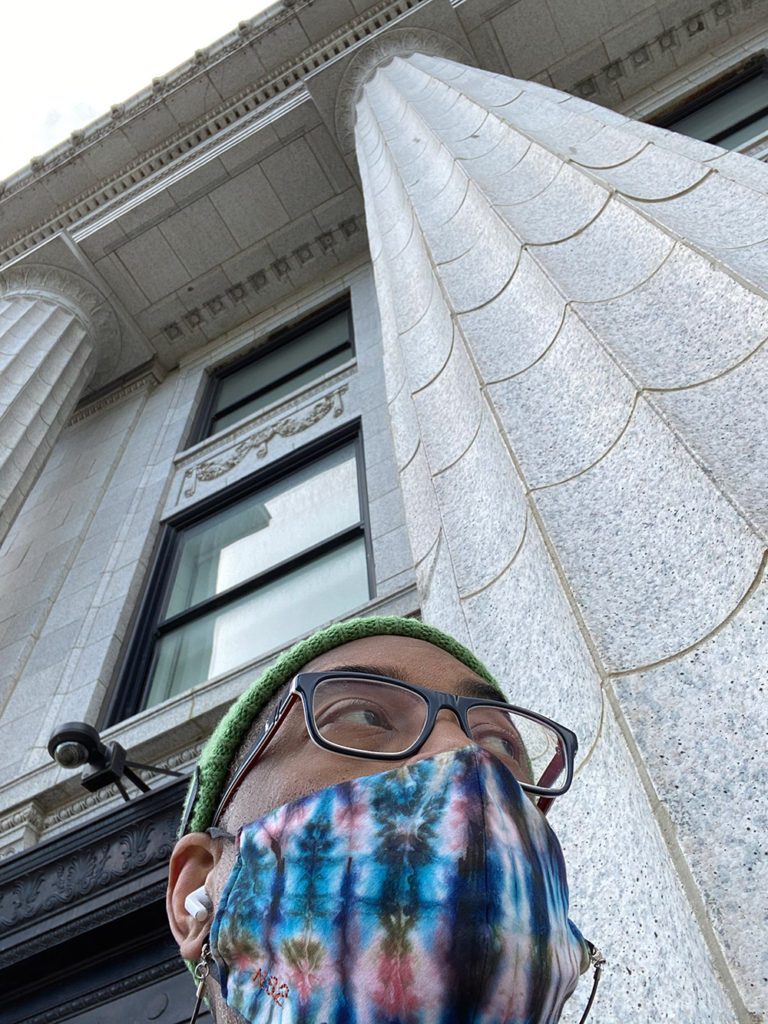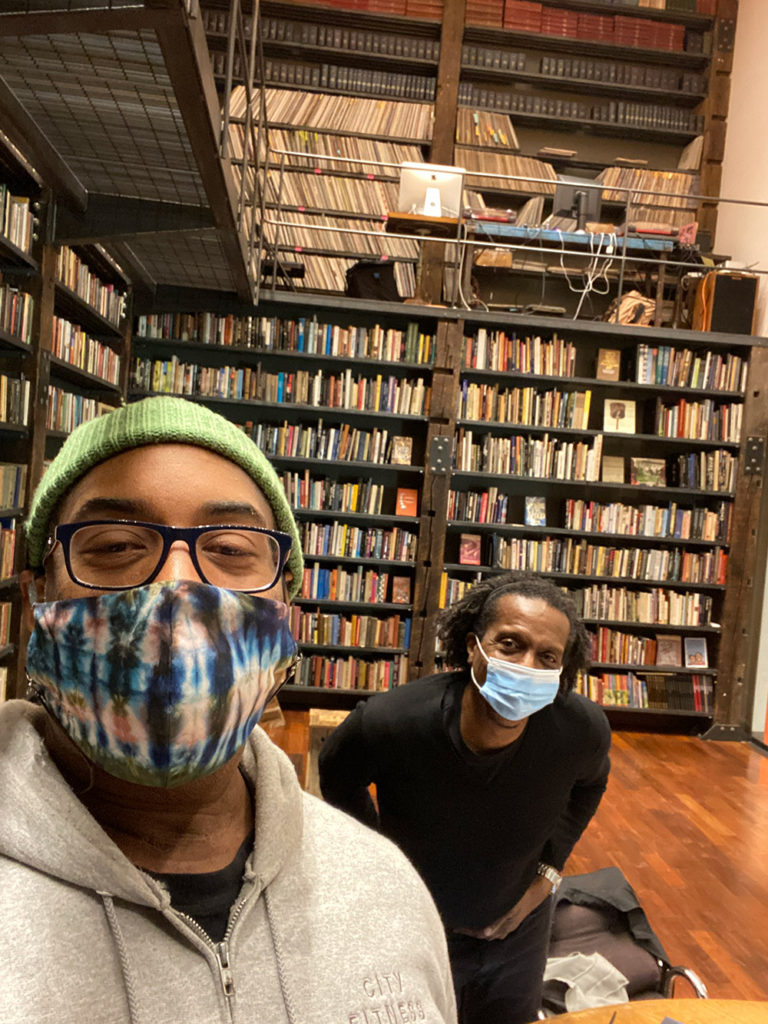
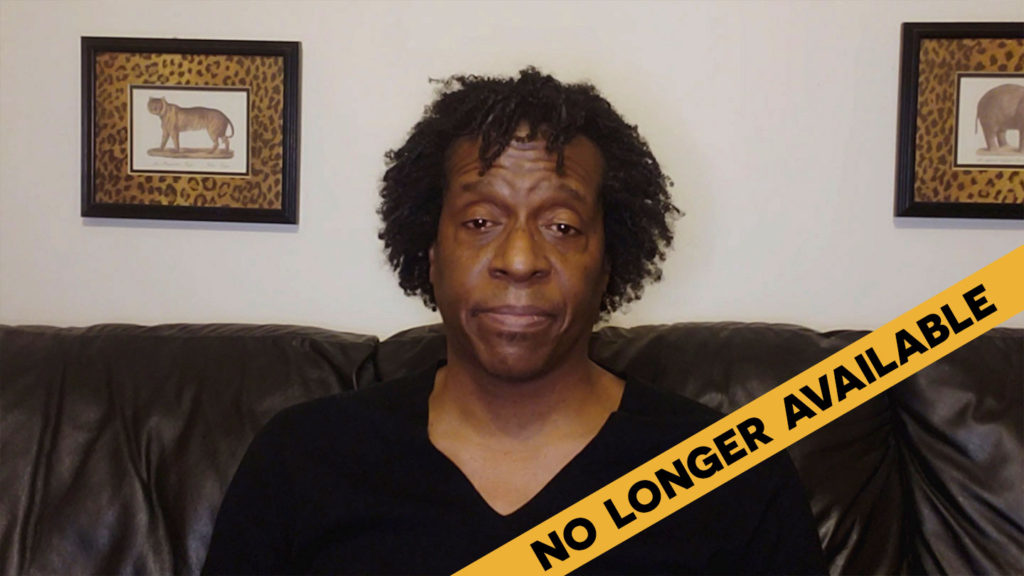
Frankie & Labi Saved Us
Written & performed by Robert Cornelius & Paul Oakley Stovall
with percussionist John Nelson
An artist suffers PTSD due to the current pandemic, and finally seeks help to sort out the feelings that are resurfacing. A play about mental health and survival, swimming in an unfamiliar milieu, black men seeking therapy… from black male therapists.
This performance is no longer available.
About the Artists
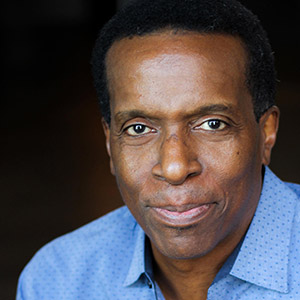
Robert Cornelius (he/him) is a Gay Black artist born and raised in Chicago, and a veteran of over three decades in the Chicago arts scene. He is an actor, singer, writer, educator, and activist that has spent much of his career fighting for justice and equality for Back people and the LGBTQIA community. Most recently onstage he was seen in Her Honor, Jane Byrne written and directed by J NIcole Brooks at Lookingglass Theatre, and Lottery Day by Ike Holter at The Goodman Theatre—both world premieres. He spent over a decade as Arts Education Director at Victory Gardens Theater, working to help young people find their voices. He is thrilled to be a part of this wonderful project at About Face Theatre.
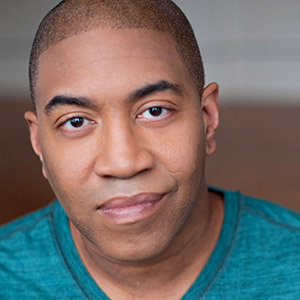
Paul Oakley Stovall has been an Artistic Associate at AFT since 1999. As an actor he’s been seen all over Chicago, National, and International stages. Currently, he plays George Washington in the first national tour of Lin Manuel-Miranda’s Hamilton. On TV/Film, he’s been seen on Shameless, Chicago Fire, Empire, in Robert Altman’s The Company, and in John Cameron Mitchell’s Shortbus. His play Immediate Family was directed by Phylicia Rashad at the Goodman and Mark Taper Forum. As a producer, his KernoForto Productions has two festival darlings currently in circulation: Columbus and Buffalo. He is also an Executive Producer on the Swedish indie smash hit Are We Lost Forever, and Netuser (written and directed by AFT co-founder Eric Rosen and starring Denis O’Hare). Currently, Paul is in Dublin researching/writing a new limited series about Frederick Douglass and workshopping his new musical, Clear.
Discussions
KICKBACK Happy Hour
Saturday, January 9, 2021
How have gay Black men been erased and diminished by other groups in the greater fight for rights and social acceptance? How has that affected our mental health? And have we participated in our own undoing?
Join Artistic Associate Sheldon Brown as he leads a conversation with KICKBACK director Mikael Burke and artists Robert Cornelius and Paul Oakley Stovall around their piece “Frankie & Labi saved Us.” The Chicago Reader called the performance “a touching historical timeline rendered through keen personal memories of what it meant to be young, queer, and Black in Chicago.”
Artist Reflections
ROBERT: So, when I first started the pandemic first hit, and people started dying, and there was no plan or hope for a cure, I was triggered and having flashbacks to when I was first coming out and into myself, and the AIDS crisis hit. There were so many similarities. That parallel became the basis for my piece.
I reached out to Paul, who I have been friends with for years, and we brainstormed and came up with a collaboration. So the larger piece became two parts, where the first part is my character seeking out help for the first time with Paul’s character and the roads that brought both of them to this moment, and then the second half of the piece, which I will leave to Paul to detail.
PAUL: I feel like there was a bit of fate involved in all of this. As the project was introduced to me, I of course began thinking of my own PAST, PRESENT, and FUTURE…and we’ve all had plenty of time in 2020 to consider these things. The trip to the Arts Bank with Robert Cornelius is really where it all began to come together for me. He was much clearer in what spoke to him and what he was seeking: A personal response to the onset of the AIDS pandemic. Robert and I sat together, and dove into Frankie Knuckles, other historic black LGBTQ icons… and most importantly perhaps… each other.
I sat across from this man, my friend, colleague, and cohort. We laughed, reminisced, and although we hadn’t been in the same room for awhile, we might as well have seen each other the day before. It began to dawn on me that the survival of the gay black man is not guaranteed, and often our honor and our mental health are called into question. Historically the tale that has been told is: black people are liars and heathens and savages, gay people are liars and sexually promiscuous and less than. So if you’re black AND gay, you are most likely a volatile combination of the two.
During our day of research, I stumbled onto the artist Labi Siffre. His music and story stirred me. As it happens, he’s the most famous songwriter you’ve never heard of, the most sampled musician in history (Kanye, Eminem among those who have “borrowed” from him), and I began to feel cheated that I’d never heard of him. I began to feel that the fix was in, that black gay men are solely responsible for our survival. And that’s when the idea came to ask Robert to partner our pieces, and I would portray a black gay male therapist who Robert had come to see…. to tell his story… and that we could also use the counterpoint of Frankie Knuckles’s thumping house beats and Labi Siffre’s folksy acoustic melodies to show a wide array of musical blackness.
My therapist character therefore will be more fictional, although not at all far from how I grew up, as he listens to Robert and uses Labi Siffre to try to help Robert heal.
